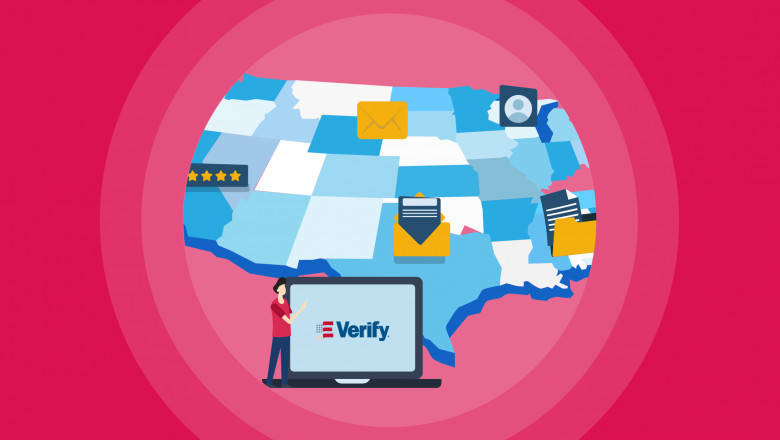views
While E-Verify remains largely voluntary at the federal level, many states have enacted legislation requiring employer participation in the program. As a result, understanding state-specific mandates is essential for employers operating across multiple jurisdictions.
Non-compliance with state-mandated E-Verify requirements can have serious consequences, including the revocation of business licenses, termination of government contracts, and reputational damage that may disrupt ongoing operations.
This blog outlines the current E-Verify mandates by state, helping employers assess their obligations, mitigate compliance risks, and ensure their hiring practices align with both federal and state laws.
What is E-Verify?
E-Verify is a web-based system operated by the U.S. Department of Homeland Security (DHS), in collaboration with the Social Security Administration (SSA). It allows employers to electronically verify the employment eligibility of newly hired individuals by comparing Form I-9 data against federal records. This helps organizations ensure compliance with USCIS requirements and reduce the risk of legal or regulatory violations.

How Does E-Verify Work?
E-Verify is a straightforward and efficient process consisting of four key steps:

State-Wise E-Verify Requirements
E-Verify requirements vary by state. While some states mandate its use for all employers, others enforce it under specific conditions, such as for public contracts or businesses of a certain size.
Below is a list of states where E-Verify is required for all or most employers when hiring new employees:
E-Verify Mandatory for All or Most Employers
Penalties
First offense: Business license suspension for up to 60 days and cancellation of state incentives.
Repeat offenses: Permanent revocation of business license.
Penalties
Revocation of business licenses
Ineligibility for state contracts and incentives
(Effective January 1, 2021): All employers, contractors, and subcontractors must use E-Verify.
(From July 1, 2023): Private employers with 25 or more employees must retain E-Verify records for three years.
Penalties
(From July 1, 2024): Repeated violations may result in daily fines of up to $1,000.
Mandatory for public employers and contractors.
Private employers with 10 or more employees must use E-Verify.
Penalties
Suspension or denial of business licenses
12-month ban on public contracts for submitting false affidavits
(Effective January 1, 2012): Public contractors and subcontractors must use E-Verify and submit a sworn affidavit.
Penalties
First violation: $500 per unauthorized worker
Second violation: $1,000 per unauthorized worker
Third violation: $2,500 per unauthorized worker and business license suspension for 30 days to 6 months
Penalties
Contract termination
Loss of permits and business licenses
Penalties
Civil fines of up to $10,000 for non-compliance
Penalties
First violation: One-year probation
Subsequent violations: License suspension ranging from 10 to 30 days
Employers with 35 or more employees must use E-Verify.
Employers with 6–34 employees may either use E-Verify or maintain copies of valid identity documents.
Penalties
Fines ranging from $500 to $2,500 per unverified employee
Penalties
Currently, no penalties are enforced for non-compliance.
E-Verify Mandatory for Public Employers and/or Contractors
Colorado
Effective July 1, 2022, E-Verify is required for contractors providing public services. (No penalties for non-compliance.)
Idaho
All state agencies (public employers) must use E-Verify, as mandated by Executive Order 2009-10 and subsequent agency guidance. (No penalties.)
Indiana
Since June 30, 2011, all state agencies, political subdivisions, and public contractors are required to use E-Verify. Grants over $1,000 require proof of E-Verify enrollment. Non-compliant contractors risk contract termination and liability for damages.
Michigan
As of March 1, 2013, state agencies and specific contractors must use E-Verify for new hires. (No penalties for non-compliance.)
Minnesota
Since July 21, 2011, contractors and subcontractors for service contracts over $50,000 must use E-Verify. Certain contracts, including those for credit reporting services, are exempt. (No penalties.)
Missouri
Effective January 1, 2009, public employers, contractors on projects exceeding $5,000, and recipients of state tax benefits must use E-Verify. Non-compliance may result in contract termination or loss of state benefits.
Nebraska
Since October 1, 2009, public employers and contractors are required to use E-Verify. The City of Fremont imposes additional penalties for non-compliance, including license revocation and contract cancellation.
Oklahoma
Public employers have been required to use E-Verify since November 1, 2007; contractors and subcontractors since July 1, 2008. Non-compliant employers are ineligible for state contracts.
Pennsylvania
Effective January 1, 2013, all public works contractors and construction employers must use E-Verify. Penalties escalate with repeated non-compliance.
Texas
Since December 3, 2014, contractors and subcontractors working with state agencies, including higher education institutions, must use E-Verify for new hires. Non-compliance may lead to contract termination.
Virginia
From December 1, 2012, all state agencies and contractors with contracts exceeding $50,000 must use E-Verify. Failure to comply results in a one-year debarment.
West Virginia
Service providers with employees regularly assigned to the State Capitol Complex are required to use E-Verify for all new hires assigned to that location.
States that Don’t Mandate E-Verify/ Voluntary
Some U.S. states have not made E-Verify a mandatory requirement, allowing its use to remain voluntary. These states include:
States that Restrict E-Verify Usage






















Comments
0 comment